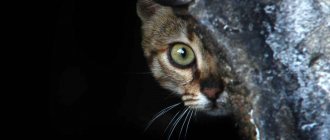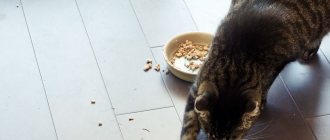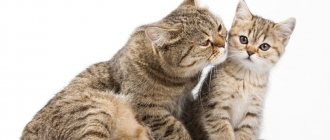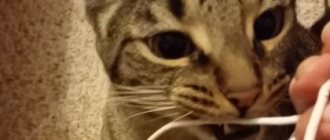Unusual item
Most experts are unanimous - it is not the cucumber itself that causes fear in an animal, but an object that appeared unexpectedly and clearly does not belong there. Jill Goldman, an animal behaviorist, explains that such a reaction can be caused by any unusual object - a hose, a mask, a toy, an eggplant.
Cats are naturally very cautious animals and prefer to assess danger from afar.
An unusual object that suddenly appears is perceived as potentially dangerous, so the cat strives to move away to a safe distance as quickly as possible in order to calmly observe the object from there.
Why are cats afraid of cucumbers?
Videos of “cats and cucumbers” on the Internet instantly become viral. Owners from all over the world place vegetables behind their pets' backs while they eat and point their cameras. Cats' reaction to cucumbers is worth thousands of likes. But why does this still happen?
Scientists believe that the point here is not that cats are afraid of cucumbers. If you place a banana, zucchini or other elongated object, the reaction will be the same. One of the most popular explanations is the similarity in shape to a snake. This version is shared by animal psychologist Jill Goldman, who specializes in the behavior of cats and dogs. She explains the cats' reaction to the cucumber by saying that snakes are one of the biggest dangers that awaited cats before they were domesticated by humans. (Read our material about how this happened and how other animals were domesticated.)
However, veterinarian, zoopsychologist and felinologist Angelina Sirotina is sure that this is not why cats are afraid of cucumbers. According to her, the animal is guided not only by vision, but also by other senses, and if an enemy appeared behind it, it would probably smell it and turn around. Otherwise, the cats simply would not survive. Consequently, they have no fear of elongated objects. Moreover, there is no fear directly of cucumbers. It’s just that the one who first decided to conduct such an experiment came across a cucumber. In its place, there could well be, for example, an eggplant, and then it would appear in the videos.
Imagine: you finish your tea, turn around and see a huge plush mouse right in front of you!
Angelina Sirotina notes that the reason lies not in the object, but in the circumstances under which the cat encounters it. Are cats afraid of cucumbers? Not at all. “The cat was taken by surprise. She was focused on something completely different and didn’t expect any trick, but then something strange happens: suddenly they slip her a cucumber. The unexpected appearance of an object can frighten any other animal, including a dog. And even a person,” notes the felinologist. In the “cat and cucumber” scene, you can quite imagine other participants.
British animal behaviorist Roger Mugford also believes that the reason is surprise and a pet may be afraid not only of a cucumber or banana, but also of a plastic fish, a mask or any other unfamiliar object. And the form has nothing to do with it. Cats are generally suspicious of any innovations, and cucumbers usually don’t lie on the floor. No wonder the cat is afraid of cucumbers. This reaction is a reflex to something new. This is also noted by Jill Goldman. She is sure that assessing potential danger is much easier and safer from a distance. That’s why the cats jump first, and then figure out what it is that’s there. (And by the way, no matter how funny cats jump, they always land confidently. In this regard, scientists also conducted an experiment and told why cats always land on all four paws.)
Some owners stubbornly try to prove that the animal’s reaction is directly related to the nationality of the cat owner
Another version of why cats are afraid of cucumbers: for animals, the place where they eat is a comfort zone, as Pam Johnson-Bennett, author of the book “Think Like a Cat,” explains. And in the video, the owners add the vegetable just during the meal. Now imagine: you finish your tea, turn around and see a huge plush mouse right in front of you! It is quite possible that you will jump too, and by the way, the mouse may be real! By the way, do you know why cats bring caught mice to their owners?
At the same time, not all cats are afraid of cucumbers, and some owners stubbornly try to prove that the animal’s reaction is directly related to the nationality of the cat’s owner. Like, Russian cats are not afraid of cucumbers. But Angelina Sirotina believes that the point is receptivity: the more emotional the animal, the more violent its reaction will be. Some may jump out of surprise and run away, huddling under the sofa, while others will begin to study the find with interest. This is how funny videos and queries appear on the Internet: how cats are afraid of cucumbers.
Experts agree on one thing: such experiments are very stressful for pets, and treating them this way is inhumane. And instead of cruel experiments, it is better to show them unfamiliar objects more often, helping them explore the world.
Previously, My Planet wrote about why cats stretch so often.
Suddenness of appearance
Research by animal psychologist John Bradshaw, author of the book “Cat Feelings,” explains why domestic cats have much stronger wild instincts than domestic dogs. It is their natural instincts that make them wary of unusual objects that appear in their “blind spot.”
The opinion of the animal psychologist is shared by another anthropopsychologist, Dr. Roger Manfred. He points out that for a successful “draw” certain conditions must be met:
- the cucumber must be long-fruited;
- you need to put it down very quietly and carefully;
- the vegetable is located behind the animal so that it does not see it ahead of time;
- The cat should be focused on food.
Each of these conditions is itself an explanation for fear. A snake-like object suddenly appears in an area that is difficult for the cat to control.
Psychological characteristics of the animal
A cat’s fear of cucumbers can also be explained by the peculiarities of its psychology. Of course, animals, like people, can be in different emotional states. The reaction of an animal, which in itself is very restless and anxious, and sometimes it is not even clear for what reasons it shows aggression, will be revealed in the form of such panic fear.
And another reasonable explanation is that when the pet was constantly intimidated with a cucumber or even beaten with it, then the cat, of course, will tremble at the sight of such a vegetable.
Invasion of the comfort zone
In addition to the effect of surprise, which can unbalance even a person, and novelty (cats are inveterate conservatives and cannot stand surprises), a frightening object appears in the area that the animal considers:
- safe;
- only yours.
A cat's territory is divided into comfort zones in which it feels safe. These are shelters or hills that are difficult for other inhabitants to climb, but convenient for the cat to observe movements. That's why pets love cabinets, hangers or boxes so much.
During sleep, bowel movements and eating, the animal is least protected, so the cat may behave aggressively or become frightened if someone or something invades this territory. An animal that is keen on eating food does not expect any trick from its beloved owner, next to whom it feels comfortable and safe.
The fact that cats feel safe next to their owner is confirmed by frequent cases when the animal brings caught prey to the doorstep of the house or directly to a person’s bed. Scientists believe that cats do this not because they want to feed a person, but so that they can then eat the prey in the safest possible place.
Is there anything I can do to help overcome this fear?
Of course you can. It is enough to put the cat in your arms, without holding it like in a vice, and show him the vegetable. At this moment, the animal should be stroked and calmed. The goal is to introduce your pet to the cucumber, allow it to smell it and touch it with its paw.
If the cat doesn’t even want to see the vegetable, you can leave it on the floor and walk away. As time passes, the pet will understand that the cucumber is not dangerous and will approach it. But if, even after these steps, the cat does not approach the cucumber, you need to remove it and not show it again. Cats and cucumbers, in this case, are incompatible things.
You can try to overcome the animal's fear
Experts do not advise experimenting on your pet. Of course, this is fun and interesting to watch, but it is dangerous for the health of the animal. Therefore, it is not worth the risk.
Stress and health
The cat's reaction of "fun" in those whom she considers to be a member of her pride and often equates to her mother cat is dangerous because it can provoke stress. The state of stress does not go away without a trace, Hans Selye, an Austrian scientist who made an invaluable contribution to the study of painful adaptation (stress), spoke about this.
Research. Lydia Rendberg, an employee of La Trobe University in Melbourne (Australia), is studying the effects of stress in cats. She warns: “Cats are sensitive creatures and react to little things around them.” Fear, loss of a sense of security, and a sense of betrayal create stress, which negatively affects the physical and mental health of the cat.
Stress causes:
- heart diseases;
- diabetes;
- obesity;
- thyroid diseases;
- pathologies of the spine and joints;
- cancer;
- pathologies of the respiratory system;
- eczema;
- mental and behavioral disorders.
Scientists believe that stress is to blame for 86% of diseases.
Therefore, animal psychologists and veterinarians appeal from the pages of magazines, newspapers and in videos to cat owners with a request to stop cruel and immoral experiments on their pets.
Also watch the video why cats are afraid of cucumbers:
What other vegetables and fruits can scare a furry pet?
Most curious owners wanted to know what else would scare the animal as much as a cucumber. During such experiments, the owners found that cats are afraid of all long vegetables and fruits: eggplants, bananas and zucchini.
How long can dogs actually live?
Note! It is not the cucumber and other vegetables themselves that causes a feeling of anxiety in the animal, but their sudden appearance nearby.
What will such experiments lead to?
The wave of video recordings does not stop, interest outweighs love for the animal and encourages people to carry out further experiments. Veterinarians and zoologists urge us to stop testing and injuring our pets.
Any fear turns into a nervous shock; continuous experiments have a bad effect on the well-being, appearance and actions of the animal:
- the pet is afraid to approach the bowl of food. He may stop eating and won’t even touch his favorite sour cream, which means weight loss and dehydration are inevitable;
- stomach diseases begin;
- the process of food digestion is disrupted;
- the fur begins to fall out in clumps;
- the animal may suffer from problems with the urinary system;
- the immune system deteriorates;
- the feeling of anxiety increases, causing the pet to experience shock;
- sleep becomes restless and sensitive.
Note! After several similar experiences, the pet stops trusting its owner. In place of a calm, sweet and kind cat comes an angry, indifferent, closed-off cat. The owners are unhappy with this condition and, of course, take the cat to the veterinarian. However, it is very difficult to return to its previous state; the dissatisfied animal begins to lose consciousness, after which it suffers a heart attack.
What does a cat get from cucumbers?
Cats do not have a love for fresh vegetables, but if your pet shows interest in them, you should not limit it. Many experienced owners recommend accustoming a kitten to vegetables by mixing them with meat. Some pets enjoy eating soups with added vegetables. In any case, eating vegetables does not cause any trouble for the cat. Conditionally unsafe vegetables include:
- Raw and boiled beets strengthen and weaken the intestines (respectively).
- Raw cabbage causes fermentation and increased gas formation.
- Boiled potatoes contain too much easily digestible starch.
Raw cucumbers cannot cause even theoretical harm to a cat unless they are sprayed with chemicals. Let's figure out what the pet lacks if it demands cucumbers or drags them from the garden:
- Cucumbers are 95% water.
- The pulp contains enzymes that have a beneficial effect on the cat's intestinal microflora.
- A small amount of vitamins: A, B1, B1, C, PP.
- A small amount of microelements: magnesium, calcium, phosphorus, potassium, iron.
Fruits in a cat's diet are a more controversial topic. Four-legged animals do not need additional carbohydrates (fruit sugar), but they do have vitamins... which fruits are rich in. Many cats love apricots, persimmons, melons, pears, and if the products are eaten in small quantities, there is nothing wrong with that. A large amount of juicy fruits and berries can lead to the development of diarrhea.
Completely different reasons need to be considered if your pet is addicted to salted or pickled cucumbers. Since such food is absolutely unusual for cats and harms their digestion, the motivation must be very significant. To begin with, you need to sell your pet a course of vitamins. One may suspect a deficiency of mineral salts, a violation of the water-salt balance and intestinal microflora.
Note! If your pet has digestive problems, it is advisable to immediately take a course of probiotics and introduce natural yogurt and other fermented milk products into the diet.
Why do people scare cats with cucumbers?
The question naturally arises: why do people like to scare their cats with cucumbers? Hardly because of senseless cruelty. If this is a pet, then they love it and do not openly wish harm. It turns out like in the book about Hajj Nassretdin, when he entered the palace under the guise of a scientist. He asked that no one think about the white monkey while he was preparing the magic - everyone only thought about the white monkey. No matter what veterinarians and scientists say about the enormous stress for the unfortunate animal, experiments with cucumbers do not stop. As soon as a person sees the video, curiosity simply bursts through him. This outrage has reached global proportions. Everyone understands that this is bad, but curiosity... is still a big disgusting thing.
How to protect garden beds from cats
There are several simple ways to help keep cats away from planting beds. If someone else's cat is inspecting your garden, talk to its owners and recommend purchasing special collars with bells and electric sensors that will allow you to control the animal's movements. But cats are very capricious, freedom-loving animals and love to explore and master new territories.
Of course, you can get a dog, but this option does not always work. If the cat liked the fresh cucumbers from your garden, the animal will find a way to sneak into the area unnoticed and taste its favorite treat.
You can drive a cat away from the garden:
- By making the plantings more dense, when the overgrown leaves completely cover the bare areas of the ground. This method will also help to wean your cat from going to the toilet in the garden beds.
- Using sprays that are safe for animals and plants and affect the animals’ sense of smell or taste. Spray the leaves of plants and the soil around vegetable crops with special aerosols that emit aromas or tastes that are unpleasant for cats. Having tried an “inedible” vegetable, the cat will not show interest in planting.
- Protecting the bushes with a protective film, an agrotechnical net, which can be purchased at garden centers. Place the net around the perimeter of the beds or cover the bushes with cucumbers on top. Choose nets with large holes so that they do not interfere with seedling growth and watering. If the cat does not have access to the seedlings, it will quickly lose interest in them.
- Special repellers for animals (cats, foxes, rodents). There are many models of electrical appliances on sale with motion sensors, the range of which is designed for different areas. The devices emit an ultrasonic signal, which is inaudible to humans, but very unpleasant to animals. Water repellers (watering systems) will also help to keep cats away from garden beds. As soon as the cat approaches the beds, the built-in sensor will work, and the animal will run away, frightened by the stream of water directed at it.
You can also discourage a cat from the garden bed by placing citrus peels around the bushes with cucumbers. Cats cannot stand the smell of oranges, tangerines, and lemons. Near the seedlings you can lay out rags soaked in ammonia and vinegar. Among the natural “repellents” you can also use garlic, onion water, hot pepper (red, black, chili).
Plant cayenne pepper or coleus near the cucumber bushes and along the beds. The leaves of this plant emit an unpleasant, repellent aroma for cats. Cats do not like the smell of wormwood, geranium, and other strong-smelling flowers.
If someone else's cat eats cucumbers in your garden bed
So, if your cat eats cucumbers in the garden, the instructions for saving the vegetables are very clear - the cat needs to buy a vitamin-mineral complex . By the way, phosphorus, magnesium and calcium are best absorbed as a complex, in a certain proportion. If a cat has a deficiency of at least one of these microelements, the addiction to cucumbers is understandable.
What to do if your garden is attacked by someone else's cat? Essentially, there is little you can do other than scare the animal away, for example with automatic sprinklers or ultrasonics. However, given the time it takes for cucumbers to set and ripen, the neighbor's cat may suffer from basic thirst. mineral water next to them . Water can be purchased or prepared. You will need:
- 0.3 liters of clean water.
- 1 tablet of vitamin-mineral complex.
- Just a little bit of salt.
The tablet should be crushed in two spoons and stirred in warm, salted water. After complete dissolution, the water needs to be cooled, poured into a bowl and placed in the shade near the garden bed. If the needs of the neighbor's cat are physiological, the mineral solution will completely satisfy them.
Another obvious option is starvation. A cat eating your cucumbers may be a mediocre hunter and acting out of hunger. Try placing a bowl with a small amount of food next to the garden bed. If after the cat’s visit the garden bed is not damaged…the reason is obvious. Try talking to the cat's owners, if you have them, or feed the four-legged cat.











